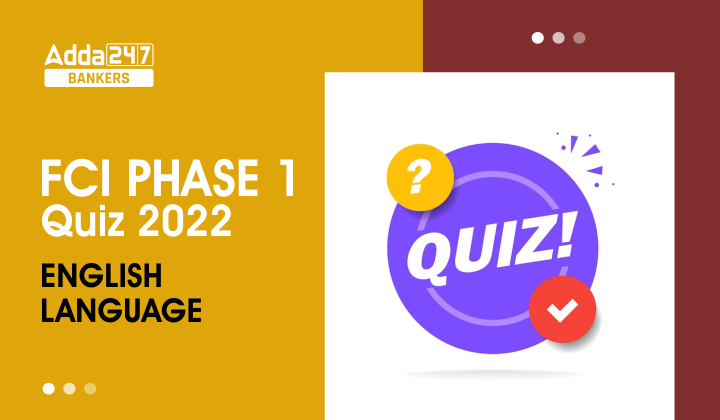Directions (1-7): In the following passage, some of the words have been left out, each of which is indicated by a number. Find the suitable word from the options given against each number and fill up the blanks with appropriate words to make the paragraph meaningfully complete.
In what has been widely termed as a last-ditch effort at resolving the __(1)____ burden of bad loans in the Indian banking sector, the Union government on May 5 issued an ordinance that seeks to stem the rot that has been __(2)___ in the sector for almost a decade. The ordinance, which amends on a temporary basis provisions of the Banking Regulation Act until its ratification by Parliament, allows the Reserve Bank of India (RBI) to ___(3)____direct control in settling non-performing assets (NPAs), which are now close to Rs.10 lakh crore.
That public sector banks, which carry the heaviest burden of NPAs, would have to undergo a deep “haircut” was always a possibility; but the ordinance now raises fears that the banks would have to go for a tonsure even as ___(4)___ and truant borrowers get off scot-free.
The key provisions of the ordinance pertain to the manner in which outstanding loans, especially those of large borrowers, can be renegotiated in a far more aggressive manner than earlier with the central bank acting as some kind of a referee, only this referee would __(5)_____ like a supremo. There are serious problems with this approach because, shorn of the legalese, what the ordinance __(6)___is the creation of an arena in which truant borrowers—many of whom have not only borrowed beyond their means but have even willfully avoided repaying the loans—can sit across the table and bargain with the banks about how much they would pay and on what __(7)__.
Q1.
(a) boosting
(b) arriving
(c) burgeoning
(d) developing
(e) progressing
Q2.
(a) festering
(b) infecting
(c) blistering
(d) concocting
(e) dissolving
Q3.
(a) applying
(b) interfere
(c) make
(d) exercise
(e) kept
Q4.
(a) indolent
(b) insolent
(c) senseless
(d) intrepid
(e) reckless
Q5.
(a) consider
(b) function
(c) treat
(d) move
(e) practices
Q6.
(a) facilitates
(b) push
(c) severe
(d) indulges
(e) provide
Q7.
(a) practice
(b) regulation
(c) rule
(d) terms
(e) promise
Direction (8-15): Read each sentence to find out whether there is any grammatical or idiomatic error in it. The error, if any, will be in one part of the sentence. The number of that part is the answer. If there is ‘No error’, the answer is (e). (Ignore errors of punctuation, if any.)
Q8. He is almost quite competent (a)/ for the post of Manager; (b)/ so when given a chance, (c)/he can lead the company to its goal (d)/ No error. (e)
(a) A
(b) B
(c) C
(d) D
(e) E
Q9. He asked me (a)/ that why I was (b)/ not preparing for the (c)/ Civil service Examinations (d)/ No error. (e)
(a) A
(b) B
(c) C
(d) D
(e) E
Q10. It was almost (a)/ ten years ago since he wrote (b)/ a letter to me to (c)/ remind me of my lapses (d)/ No error (e)
(a) A
(b) B
(c) C
(d) D
(e) E
Q11. By whom (a)/ was he helped (b)/ when he seriously wounded(c)/ by a terrorist? (d)/ No error (e)
(a) A
(b) B
(c) C
(d) D
(e) E
Q12. She held something (a)/ at her side which (b)/ was totally hiding (c)/ by the folds of her sari. (d)/ No error. (e)
(a) A
(b) B
(c) C
(d) D
(e) E
Q13. Accepting (a)/ all sorts of challenges (b)/ that life offers is (c)/ a pleasure to the brave (d)/ No error (e)
(a) A
(b) B
(c) C
(d) D
(e) E
Q14. Mr. Gupta disowned (a)/ his son only because (b)/ he was married (c)/ a blind girl. (d)/ No error. (e)
(a) A
(b) B
(c) C
(d) D
(e) E
Q15. He was determined to (a)/ participate in the car race (b)/ even though he knew (c)/ that he will not succeed. (d)/ No error. (e)
(a) A
(b) B
(c) C
(d) D
(e) E
Solutions
S1. Ans. (c)
S2. Ans. (a)
S3. Ans. (d)
S4. Ans. (e)
S5. Ans. (b)
S6. Ans. (a)
S7. Ans. (d)
S8. Ans. (a)
Sol. ‘almost’ will not be used here because Adverb is not used before ‘quite’.
S9. Ans. (b)
Sol. ‘that’ will not be used as in indirect narration before ‘Wh-question’, conjunction is not used.
S10. Ans. (b)
Sol. ‘that’ will be used in place of ‘since’ as after ‘ago’, conjunction ‘that’ is used, not ‘since’. Ex. It was ten years ago that his father died.
S11. Ans. (b)
Sol. ‘was’ will be used after ‘he’ as sentence is in passive voice.
S12. Ans. (c)
Sol. Use ‘hidden’ in place of ‘hiding’ as in passive voice ‘To Be + third form of verb’ is used.
S13. Ans. (e)
Sol. The sentence is grammatically correct.
S14. Ans. (c)
Sol. Use ‘had’ in place of ‘was’.
S15. Ans. (d)
Sol. ‘would’ will be used in place of ‘will’ because in starting clause of “even though” ‘he knew’ is in past tense, therefore in “that-clause” also Past tense will be used.





 English Language Quiz For Bank Foundatio...
English Language Quiz For Bank Foundatio...
 English Language Quiz For Bank Mains Exa...
English Language Quiz For Bank Mains Exa...





